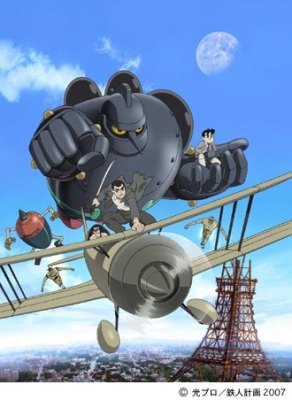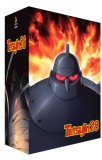| Reviews & Columns |
|
Reviews DVD TV on DVD Blu-ray 4K UHD International DVDs In Theaters Reviews by Studio Video Games Features Collector Series DVDs Easter Egg Database Interviews DVD Talk Radio Feature Articles Columns Anime Talk DVD Savant Horror DVDs The M.O.D. Squad Art House HD Talk Silent DVD
|
DVD Talk Forum |
|
|
| Resources |
|
DVD Price Search Customer Service #'s RCE Info Links |
|
Columns
|
|
|
Tetsujin28 - The Complete Series
It's a terrific show superbly mixing retro-anime character design and postwar history with visually stunning cutting edge TV animation in a 16:9 enhanced, Dolby Digital presentation in its original Japanese. (An English-dubbed track is also offered.)
The series is set in 1955, ten years after Japan's crushing defeat at the end of World War II, a time when the memories of the Tokyo fire bombings and the Allied Occupation were still fresh on everyone's minds, while at the same time a new postwar, first-world country was beginning to emerge from its ashes. It is a time full of optimism and excitement about Japan's new potential in the world community.
But this is an alternate-universe 1955, where news of the discovery of a classified wartime Japanese weapons laboratory on a Southeast Asian island threatens the peace. Over the course of the first few episodes, it's revealed that scientist Dr. Kaneda (Shozo Iizuka) had, after 27 failures, developed an enormous robot super-soldier, "Tetsujin28" ("Ironman28"), to defeat the Allied forces, but his laboratory was destroyed near the end of the war and his experiments all but forgotten. Ten years later the robot is accidentally activated, and it makes a beeline for Tokyo.
Kaneda's 10-year-old son, a near-genius, tough-as-nails boy detective named Shotaro (Motoko Kumai), regards the robot as a kind of half-brother, and with the help of Shotaro's foster parent, the famous industrialist-inventor Professor Shikishima (Shigeru Ushiyama), also Kaneda's former protegee, eventually the boy is able to control Tetsujin28 through its remote controller.
Tetsujin28's arrival disturbs gangster Kenji Murasame (Yuji Mikimoto)), who lost most of his family during the fire bombings of Tokyo, and who hates all weapons of war. He sees Tetsujin28 as a perverse symbol of Japan's militarism and wants to destroy it. Meanwhile, Japan faces various cataclysmic threats only the fantastic giant robot can stop.
The creation of Mitsuteru Yokoyama, who sadly died in a house fire a week after the first episode aired, Tetsujin28 began as a 1956 manga (Japanese comic book) serialized in Shonen. It was famously first adapted as a 1963-65 TV series, Japan's second animated TV show after Tetsuwan Atom/Astro Boy, and later imported into the U.S. and adapted as Gigantor. An ugly-looking series called Tetsujin 28-go FX aired during 1992-93, but it bore little resemblance to Yokoyama's original creation. The success of the retro 2004 series led to a live-action Tetsujin28 movie in 2005, and an animated feature in the style of the 2004 show this past March.
Probably spurred by a recent wave for postwar nostalgia that has resulted in myriad TV dramas and the hit movie, Always - Sunset on Third Street (Always San-chome no yuhi, 2005) and its sequel, Tetsujin28 positively oozes with postwar color, and to the series' great credit really seems to nail the atmosphere of the time exactly right. It's not a postwar Japan viewed through rose-colored glasses, but one admirably close to the spirit of the great early postwar Japanese films of the late-1940s through late-1950s.
Its scripts grapple with the culpability of Japan's wartime militarism, its postwar renouncement of war, while tracing early hints of its rise as a superpower. Sometimes these issues are handled in curious ways just as Japan, more than 60 years on, is still trying to make sense of its own history and its impact on daily life today. In any case the characters are impressively adult and humanistic in the sense that the antagonists aren't all bad and their motives understandable, while conversely the show's heroes are flawed in various ways.
Of course, the real draw for most will be the show's awesomely impressive action set pieces, the battles of Tetsujin28 with various rival robots and other monsters, and the Godzilla-scale destruction of Japan's urban landscapes. As I wrote at the beginning of this review, I haven't seen very much television anime and thus have little to compare it with, but visually Tetsujin28 is extremely impressive, certainly head-and-tails above anything being produced in America. Unlike, say, the overrated Always, Tetsujin28 never betrays its '50s stylization, consistently looking like something of animators in 1956 might have produced had they the budget and animation technology available today. (Akira Senju's full-bodied score, performed by the Warsaw Philharmonic, is similarly noteworthy.)
Video & Audio
The 1.78:1, 16:9 enhanced presentation of Tetsujin28 adds enormously to its epic-ness, and the near-flawless transfers bring out the show's incredible pallet of color and subtle shadowing (at times the show borders on noir). Early Japanese animation was criticized by some for its limited movement, but that's not an issue here; CGI is incorporated to some extent, but admirably never is intrusive nor does it draw attention to itself. Four-to-six half-hour episodes are included on each single-sided disc, which are offered in their original Japanese (with full and text-only English subtitle options), and in a less-impressive English-dubbed version. The Japan-based Geneon Entertainment has taken a lot of obvious care to get this right. Even the shows theme songs are subtitled, translated into English and also offered in romanji so that viewers can sing along in Japanese if they so choose. There are no Extra Features to speak of except for a Non-Credit opening.
Parting Thoughts
Hard-core anime fans may find Tetsujin28 is bit old-fashioned and melodramatic in its faithfulness to the original manga, but for older viewers and more casual anime fans, this series is marvelous fun. Recommended.
Film historian Stuart Galbraith IV's most recent essays appear in Criterion's new three-disc Seven Samurai DVD and BCI Eclipse's The Quiet Duel. His audio commentary for Invasion of Astro Monster is now available.
|
| Popular Reviews |
| Sponsored Links |
|
|
| Sponsored Links |
|
|
| Release List | Reviews | Shop | Newsletter | Forum | DVD Giveaways | Blu-Ray | Advertise |
|
Copyright 2024 DVDTalk.com All Rights Reserved. Legal Info, Privacy Policy, Terms of Use,
Manage Preferences,
Your Privacy Choices | |||||||















